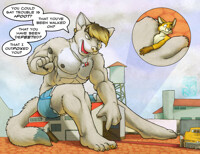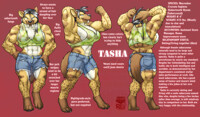
File type: Text File (.txt) [Download]
-----------------------------------------
The chalk ticked repeatedly as the master wrote on the board. The master, a heavyset brok, was quite old, though not to say feeble. He was a hundred and ten still fit compared, even compared to some of the young students who were just now growing out of their teens, and had grown up on a sedentary lifestyle. Even the room was mostly spared from the summer heat, though the magic was only temporary and the number of warm bodies pushed that temperature back up.
"You have to forget all you know about distribution and logistics," he said, "what we reserve for a national scale, they imparted to every individual in every culture, save for the occasional small, isolated village. The basis for this system is what, Sharikola?" he said, without turning away from the board.
Shari froze, halfway through the curtain that divided the room from the outside. The other adolescents snickered, all of them sitting of laying on cushions that filled the room, either on the bench lining its perimeter or simply on the floor. The master turned around with folded his arms, trimmed but long claws sticking out from under each side.
Shari stared. "I . . ." He stumbled over his words. "How am I supposed to know that!?"
The master said nothing, but stepped aside, revealing a single word in large block syllabograms: personal property.
All the other students laughed.
"What's that even supposed to mean?" Shari said, his ears burning a shade of red on their inside, "We have personal property!"
"Perhaps a little," the master said, gesturing for Shari to take his seat, which he did begrudgingly.
Fortunately, as the room was already becoming warm, Shari didn't have to confront any of the other roko in the class who might lean against him for body heat; he did not like the personal contact that so many of his peers had no qualms about. Even so, some of the students leaned against each other out of habit.
"You still possess that sword, do you not?" the master continued.
"It was my mother's sword," Shari said, "and that's personal property, because it would be wrong for another to use it."
"No, not wrong," the master said, "impolite. There's a difference. You see, the basis for our law says that everything in this room belongs to all of us, because we all belong to the nation of New Haven. Your sword is just as much mine to use as it is yours, but because it has sentimental value to you, we agree that it would be improper for me to do so, just as much as it would be improper for one the other students to snatch your shenti off your waist and wear it himself."
The other students giggled. Shari didn't know what was so funny about it. He glanced around to find smiling students looking in his direction with smirks on their faces. He was never certain if they were not intentionally mocking him.
"However, with the ancients," the master continued, "it was different. If someone took a sword which had been given to you, they had legal grounds to stand on as much as if some roko from Old Haven took an ox from our fields. In addition, they were given a great deal more leverage over what they did possess. For instance, our young coni could not, under our system, take his sword and melt it into steel ingots."
Shari inhaled reactively and scooted back on the stone bench. Though the notion were stated as nothing more than a hypothetical, it felt deeply blasphemous to even suggest such a thing could be done.
"Despite having that sense of belonging to him, it is a sword that belongs to the whole nation; as such it can only be destroyed with the permission of those who are in charge over such matters, who would know if it is in the best interests of the nation. But if it did belong to him in the sense of personal property, he could do nearly anything he wished with the object itself, if not exactly employ it as a tool to, ah, solve all his problems."
Before Shari could say anything that would result in being kicked out of the classroom, again, someone else spoke up.
"That seems an awfully convoluted way of doing things," said Tako, a young raku who was laying in the center of the room with his head on a young female's lap. He swished his ringed tail about lazily. "Someone so much as touches your things and bam!" He shot his fist upward, "you're in court! It seems like every other roko in the world would have to be a judge for that system to work."
"Well yes, there were quite a few more who worked in matters of the law," the master said, raising up a finger, "but not as much as you might think. This sort of legal claim would not be invoked on people you know. One would not take his brother to court for accidentally wearing his shirt. In a larger sense, it was expected that if you had enough, you would share the excesses anyway--a hope that did not always pan out. There were always people who held onto their possessions greedily, because someone of lesser character might simply come along and steal their whole livelihood."
"Wait, their livelihood?" The raku sat up, as though the whole matter had suddenly offended him. "This is not making any sense, sir. If this property is not given to them, how did they get any in the first place?"
"Trade," Shari said, suddenly picking up on the thread of the conversation. He'd only read a book about it once, as the ancients were not his particular field of study. He preferred military history, the stories where the struggle of millions against an insoluble suffering came to a head. However, he could see where most of this was going.
Shari held up his book. "If I wanted a book, I would have to trade with the printer who made it. The printer would have traded with the paper-maker. The paper-maker would have traded with the forester. The forester would have traded with the land-owner."
"Something like that," the master said, not entirely satisfied with Shari's model, but it was one that Shari came up with off the top of his head so he let it go. He leaned against the chalkboard and folded his arms. "Do go on."
"In each step of the way, every roko adds value to the product. Paper is worth more than paper pulp, because it takes effort to change it into a more useful state--it's the same in our logistical categories for goods. So, when I trade with the printer for the book, I give him something worth more, perhaps a lot more, than what he traded to get the paper."
"The forester would get the raw deal then," Tako said, "as his product is worth the least. Nobody would want to be a forester if being a printer gives you more."
"Perhaps," Shari said, "but the printer for all his effort makes only so many books, while the forester cuts down many dozens of trees. And the forester would not even have to learn how to read or write in order to do it; all he would have to do is have a tree that needs cutting down, and he has a means of gaining property through trade."
"That's a very good explanation," the master said, "the root of any system of economics always begins with work. The difference between us and the ancients stems from how we view property; as a result, how we view work is entirely different. They worked in order to acquire things they personally needed, while we work in order to provide for the needs of others."
Shari slumped back in his seat, what fire he had quickly extinguished. He never bought that last part. He never considered himself to be working for others, especially since he was told so soon after the incident that he was meant to be a historian. The process always felt one step removed, as though understanding this fact was in itself a chore.
He ended up letting his point drop and his ears sag, despite it continuing to eat at his thoughts. The master went on to discuss the system of property under the ancients and how it affected their perceptions of morality, until the sun dimmed behind the curtain, and everyone was quietly groaning from hunger.
"That's enough for now," the master said, placing the stick of chalk down. The last word written on the board was in a different script than normal. "The last word for today is money. You'll note I wrote this one in Ukora script, because we don't have an equivalent word. The Flying City uses it. If you look for information on the Flying City's use of money, currency or coinage, then we can compare it to the ancient's use of the same concept--and how far they took it."
After the room emptied of the rest of the students, the master confronted Shari. Even though the master merely sat across from him in the empty room, as he was a rather heavyset brok, he always loomed over the students. Shari wasn't even full grown for a coni, and despite all his training which vastly tightened up his musculature, it looked increasingly like he would never even approach the size his mother was, which was to say, still modestly small.
Shari wiped his glasses against his shenti repeatedly, despite the fact that they were as wiped down as they were going to get.
"Shari, you're brilliant," the master went on to say tapping his claws against the desk with some agitation; his claws were quite large, though he took the opportunity to trim them frequently. "You're honestly one of my smartest students. You absorb everything that's put in front of you. You came up with a wonderful analysis of a concept you'd barely even heard of until three seconds beforehand. If you would just show up on time, you'd be at the top of the class. You could even be Master Historian one day. What you're wasting smacks of laziness."
"I'm not lazy," Shari countered. He would have contended that he was, in fact, the least lazy roko in his class, but that would only invite questions of what it was precisely he had been spending all of his time on.
"I would like to see this with my own eyes someday," the master said. "Despite everything you've been through, you're a fortunate roko. So what's the matter? Why all of this resistance to doing your duty?"
"You know," Shari said somberly, "when my father was alive, he would tell me things like, 'wash your mouth after drinking milk,' and, 'don't wipe your mouth with your ear.' And he would tell me, always in the same words: 'You have to tell the clerk when you take something out of the depository. Food, clothing, games, anything, make sure he knows. He keeps a record and plans several seasons into the future on when and how to stock. He needs to tell the master what's needed, the master tells the guild, the guild informs the artisans and farmers, and it's hard enough having them fill the orders without misinformation on top of it. So don't forget to tell the clerk.'"
Shari looked up at the master. "I always forgot to tell the clerk. I still do, sir, even though I know in the back of my head that informing the clerk ought to have the weight of a hundred thousand roko whose lives hinged on having the most accurate information possible. But to me, from what I can see and feel and taste and touch, all those things are . . . arbitrary."
"Is washing to keep yourself free from disease arbitrary?" the master asked.
"And that's another thing," Shari said, "I don't like taking baths! I only keep clean because I don't want to be blamed for spreading disease. Nobody goes to the bathhouse because they consciously enjoy the satisfaction of not being diseased, they do it because it's another chance to socialize. I don't socialize very well, sir, and so baths are a dreadful bore."
"It seems to me," the master said, "the problem lies in these things not having a direct impact on you."
Shari planted his hands on his hips and scoffed. "So, what, you're going to tell me I'm selfish just because I don't feel the same way as everyone else?"
"What I'm saying is that you need more opportunities to expand your horizons," the master said, "find something you can care about that has to do with other roko. Which brings me to what I was going to tell you--you see, I had an offer for a private dinner, but I have a previous engagement . . . "
-----------------------------------------
The chalk ticked repeatedly as the master wrote on the board. The master, a heavyset brok, was quite old, though not to say feeble. He was a hundred and ten still fit compared, even compared to some of the young students who were just now growing out of their teens, and had grown up on a sedentary lifestyle. Even the room was mostly spared from the summer heat, though the magic was only temporary and the number of warm bodies pushed that temperature back up.
"You have to forget all you know about distribution and logistics," he said, "what we reserve for a national scale, they imparted to every individual in every culture, save for the occasional small, isolated village. The basis for this system is what, Sharikola?" he said, without turning away from the board.
Shari froze, halfway through the curtain that divided the room from the outside. The other adolescents snickered, all of them sitting of laying on cushions that filled the room, either on the bench lining its perimeter or simply on the floor. The master turned around with folded his arms, trimmed but long claws sticking out from under each side.
Shari stared. "I . . ." He stumbled over his words. "How am I supposed to know that!?"
The master said nothing, but stepped aside, revealing a single word in large block syllabograms: personal property.
All the other students laughed.
"What's that even supposed to mean?" Shari said, his ears burning a shade of red on their inside, "We have personal property!"
"Perhaps a little," the master said, gesturing for Shari to take his seat, which he did begrudgingly.
Fortunately, as the room was already becoming warm, Shari didn't have to confront any of the other roko in the class who might lean against him for body heat; he did not like the personal contact that so many of his peers had no qualms about. Even so, some of the students leaned against each other out of habit.
"You still possess that sword, do you not?" the master continued.
"It was my mother's sword," Shari said, "and that's personal property, because it would be wrong for another to use it."
"No, not wrong," the master said, "impolite. There's a difference. You see, the basis for our law says that everything in this room belongs to all of us, because we all belong to the nation of New Haven. Your sword is just as much mine to use as it is yours, but because it has sentimental value to you, we agree that it would be improper for me to do so, just as much as it would be improper for one the other students to snatch your shenti off your waist and wear it himself."
The other students giggled. Shari didn't know what was so funny about it. He glanced around to find smiling students looking in his direction with smirks on their faces. He was never certain if they were not intentionally mocking him.
"However, with the ancients," the master continued, "it was different. If someone took a sword which had been given to you, they had legal grounds to stand on as much as if some roko from Old Haven took an ox from our fields. In addition, they were given a great deal more leverage over what they did possess. For instance, our young coni could not, under our system, take his sword and melt it into steel ingots."
Shari inhaled reactively and scooted back on the stone bench. Though the notion were stated as nothing more than a hypothetical, it felt deeply blasphemous to even suggest such a thing could be done.
"Despite having that sense of belonging to him, it is a sword that belongs to the whole nation; as such it can only be destroyed with the permission of those who are in charge over such matters, who would know if it is in the best interests of the nation. But if it did belong to him in the sense of personal property, he could do nearly anything he wished with the object itself, if not exactly employ it as a tool to, ah, solve all his problems."
Before Shari could say anything that would result in being kicked out of the classroom, again, someone else spoke up.
"That seems an awfully convoluted way of doing things," said Tako, a young raku who was laying in the center of the room with his head on a young female's lap. He swished his ringed tail about lazily. "Someone so much as touches your things and bam!" He shot his fist upward, "you're in court! It seems like every other roko in the world would have to be a judge for that system to work."
"Well yes, there were quite a few more who worked in matters of the law," the master said, raising up a finger, "but not as much as you might think. This sort of legal claim would not be invoked on people you know. One would not take his brother to court for accidentally wearing his shirt. In a larger sense, it was expected that if you had enough, you would share the excesses anyway--a hope that did not always pan out. There were always people who held onto their possessions greedily, because someone of lesser character might simply come along and steal their whole livelihood."
"Wait, their livelihood?" The raku sat up, as though the whole matter had suddenly offended him. "This is not making any sense, sir. If this property is not given to them, how did they get any in the first place?"
"Trade," Shari said, suddenly picking up on the thread of the conversation. He'd only read a book about it once, as the ancients were not his particular field of study. He preferred military history, the stories where the struggle of millions against an insoluble suffering came to a head. However, he could see where most of this was going.
Shari held up his book. "If I wanted a book, I would have to trade with the printer who made it. The printer would have traded with the paper-maker. The paper-maker would have traded with the forester. The forester would have traded with the land-owner."
"Something like that," the master said, not entirely satisfied with Shari's model, but it was one that Shari came up with off the top of his head so he let it go. He leaned against the chalkboard and folded his arms. "Do go on."
"In each step of the way, every roko adds value to the product. Paper is worth more than paper pulp, because it takes effort to change it into a more useful state--it's the same in our logistical categories for goods. So, when I trade with the printer for the book, I give him something worth more, perhaps a lot more, than what he traded to get the paper."
"The forester would get the raw deal then," Tako said, "as his product is worth the least. Nobody would want to be a forester if being a printer gives you more."
"Perhaps," Shari said, "but the printer for all his effort makes only so many books, while the forester cuts down many dozens of trees. And the forester would not even have to learn how to read or write in order to do it; all he would have to do is have a tree that needs cutting down, and he has a means of gaining property through trade."
"That's a very good explanation," the master said, "the root of any system of economics always begins with work. The difference between us and the ancients stems from how we view property; as a result, how we view work is entirely different. They worked in order to acquire things they personally needed, while we work in order to provide for the needs of others."
Shari slumped back in his seat, what fire he had quickly extinguished. He never bought that last part. He never considered himself to be working for others, especially since he was told so soon after the incident that he was meant to be a historian. The process always felt one step removed, as though understanding this fact was in itself a chore.
He ended up letting his point drop and his ears sag, despite it continuing to eat at his thoughts. The master went on to discuss the system of property under the ancients and how it affected their perceptions of morality, until the sun dimmed behind the curtain, and everyone was quietly groaning from hunger.
"That's enough for now," the master said, placing the stick of chalk down. The last word written on the board was in a different script than normal. "The last word for today is money. You'll note I wrote this one in Ukora script, because we don't have an equivalent word. The Flying City uses it. If you look for information on the Flying City's use of money, currency or coinage, then we can compare it to the ancient's use of the same concept--and how far they took it."
After the room emptied of the rest of the students, the master confronted Shari. Even though the master merely sat across from him in the empty room, as he was a rather heavyset brok, he always loomed over the students. Shari wasn't even full grown for a coni, and despite all his training which vastly tightened up his musculature, it looked increasingly like he would never even approach the size his mother was, which was to say, still modestly small.
Shari wiped his glasses against his shenti repeatedly, despite the fact that they were as wiped down as they were going to get.
"Shari, you're brilliant," the master went on to say tapping his claws against the desk with some agitation; his claws were quite large, though he took the opportunity to trim them frequently. "You're honestly one of my smartest students. You absorb everything that's put in front of you. You came up with a wonderful analysis of a concept you'd barely even heard of until three seconds beforehand. If you would just show up on time, you'd be at the top of the class. You could even be Master Historian one day. What you're wasting smacks of laziness."
"I'm not lazy," Shari countered. He would have contended that he was, in fact, the least lazy roko in his class, but that would only invite questions of what it was precisely he had been spending all of his time on.
"I would like to see this with my own eyes someday," the master said. "Despite everything you've been through, you're a fortunate roko. So what's the matter? Why all of this resistance to doing your duty?"
"You know," Shari said somberly, "when my father was alive, he would tell me things like, 'wash your mouth after drinking milk,' and, 'don't wipe your mouth with your ear.' And he would tell me, always in the same words: 'You have to tell the clerk when you take something out of the depository. Food, clothing, games, anything, make sure he knows. He keeps a record and plans several seasons into the future on when and how to stock. He needs to tell the master what's needed, the master tells the guild, the guild informs the artisans and farmers, and it's hard enough having them fill the orders without misinformation on top of it. So don't forget to tell the clerk.'"
Shari looked up at the master. "I always forgot to tell the clerk. I still do, sir, even though I know in the back of my head that informing the clerk ought to have the weight of a hundred thousand roko whose lives hinged on having the most accurate information possible. But to me, from what I can see and feel and taste and touch, all those things are . . . arbitrary."
"Is washing to keep yourself free from disease arbitrary?" the master asked.
"And that's another thing," Shari said, "I don't like taking baths! I only keep clean because I don't want to be blamed for spreading disease. Nobody goes to the bathhouse because they consciously enjoy the satisfaction of not being diseased, they do it because it's another chance to socialize. I don't socialize very well, sir, and so baths are a dreadful bore."
"It seems to me," the master said, "the problem lies in these things not having a direct impact on you."
Shari planted his hands on his hips and scoffed. "So, what, you're going to tell me I'm selfish just because I don't feel the same way as everyone else?"
"What I'm saying is that you need more opportunities to expand your horizons," the master said, "find something you can care about that has to do with other roko. Which brings me to what I was going to tell you--you see, I had an offer for a private dinner, but I have a previous engagement . . . "
This is part 2 of the beta version of Heaven is Other Roko. While I personally like this section, I'm still wary about including it. Why did I include it anyway? Because I kinda-sorta intended this story to be a primer on the INA world, and this contains a large chunk of the basis for the political systems in as interesting a context as I could develop, if only because it's a fish-out-of-water perspective.
It's ALSO important because you do sorta need to know how the system works in order to understand how Shari feels disassociated from it. It's possible it's just too long as it is.
Anyway, I hope you enjoy my ramblings nonetheless. I'll probably only start posting sections every other day from now on, because I do have other things I absolutely must work on.
(If you can't tell, brok = badger and raku = raccoon)
It's ALSO important because you do sorta need to know how the system works in order to understand how Shari feels disassociated from it. It's possible it's just too long as it is.
Anyway, I hope you enjoy my ramblings nonetheless. I'll probably only start posting sections every other day from now on, because I do have other things I absolutely must work on.
(If you can't tell, brok = badger and raku = raccoon)
Category Story / All
Species Unspecified / Any
Gender Any
Size 120 x 120px
File Size 11.9 kB

 FA+
FA+















Comments